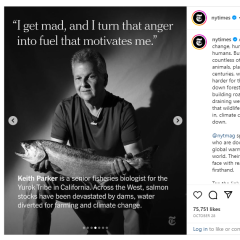About Keith's Work
Keith Parker is a Senior Fisheries Biologist for the Yurok Tribe of California and an enrolled member. He co-stewards harvest management of fish on the lower 44-miles of the Klamath River 8-months of the year with up to 15 technicians and conducts genetic analysis of returning Trinity River Hatchery salmon in collaboration with UC Santa Cruz. Keith also chairs two graduate student committees at UC San Diego – SCRIPPS Institution of Oceanography who conduct research on Klamath Basin salmon. He is also a lecturer on staff with Cal Poly Humboldt, teaching ESM 105 (Natural Resource Conservation). Prior, Keith conducted numerous fisheries biology, hydrology, and river ecology research projects in Alaska, Washington, Idaho and California - funded by the National Science Foundation (NSF). Keith received a BS degree in Fisheries Biology in 2015 and a MS degree in Natural Resources in 2018, both from Cal Poly Humboldt, with a thesis on conservation genetics. He examined the spatiotemporal genetic structure of Klamath River Pacific lamprey (eels) using high-throughput genetic sequencing and discovered two new ecotypes of “eels”, naming them using words from the Yurok language. Keith’s work was published in two peer-reviewed scientific journals. He is a 2018 NOAA and NSF GRIP awardee, 2016 Robert and Patricia Switzer Fellow, 2015 NSF GRFP Fellow, 2012 NSF URM Fellow, and has won research awards at both the AISES and NSF Emerging Researchers Network national conferences. Keith also sits on the Klamath River Technical Team, Cal Poly Humboldt’s President’s Native American Advisory Committee and was appointed to the Oregon Fish and Wildlife Pacific Lamprey Technical Workgroup Committee in 2017. Prior to returning to college, Keith was the CEO of the Yurok Economic Development Corporation and prior to that was a Federal agent for the Naval Criminal Investigative Service (NCIS) with a rank of Sergeant and three letters of commendation. Keith lives near the Yurok reservation at the mouth of the Klamath River and has focused his studies on tribal trust fish species and dam removals. His goal is to always be a catalyst for positive environmental change by being a “translator” in bridging the gaps between traditional ecological knowledge and western science.



